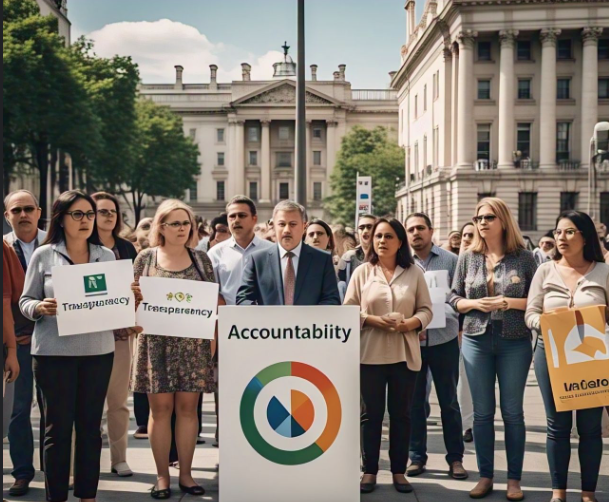Table of Contents
Civic engagement is reinforced by high levels of social trust. When people trust each other and the institutions around them, they are more likely to actively participate in their community and democratic processes. Social trust creates a supportive environment where individuals feel their voice matters, and that their actions can make a positive impact. This is why strong civic engagement is often seen in societies where trust in fellow citizens and leaders is high.
When people believe that their community and its members are reliable, they feel encouraged to take part in activities like voting, volunteering, and working together on local issues. On the other hand, low levels of trust can lead to feelings of uncertainty and apathy, which can make people less likely to engage in these important civic actions. In this article, we will explore how social trust shapes civic engagement and the vital role it plays in building a more connected, stronger society.
What is Civic Engagement and How Social Trust Supports It
Civic engagement is reinforced by high levels of social trust, meaning that when people trust each other, they are more likely to participate in their communities and vote in elections. Social trust creates a safe and supportive environment, where people believe their efforts will have a positive effect on society. This connection makes people feel like they are part of something bigger than themselves.
When people have trust in their leaders, neighbors, and institutions, they feel empowered to engage in actions that help their community. For example, they may volunteer for local charities, join town hall meetings, or even start local initiatives. The more people trust one another, the more they are willing to contribute to the greater good.
Civic Engagement Is Reinforced by High Levels of Social Trust: Why It Matters

Civic engagement is reinforced by high levels of social trust because trust brings people together to work toward common goals. Trust means people believe their neighbors or fellow citizens will act responsibly and support shared ideas. When this trust exists, people are more likely to participate in democratic processes like voting or community organizing.
A strong sense of social trust makes people feel that their voices matter. When trust is low, people tend to feel disconnected from the political system and believe that their involvement won’t change anything. This can lead to political apathy and disengagement, harming both individual communities and democracy as a whole. High trust, on the other hand, leads to more active participation and a more vibrant democracy.
The Role of Social Trust in Encouraging Voting and Community Volunteering
When civic engagement is reinforced by high levels of social trust, people are more likely to vote and volunteer for their communities. This is because trust helps people feel like they are part of a system that works for everyone. People who trust their fellow citizens and institutions are more likely to take action in elections or local projects.
Why Trust is Important for Voting and Volunteering:
- Voting: People who trust that their vote counts are more likely to participate in elections.
- Volunteering: Trusting others makes people feel safe in working together for common causes.
- Community Growth: Higher trust leads to stronger bonds in the community, making people more willing to help each other.
Trust can also encourage people to collaborate on community issues, whether it’s helping clean up a park or organizing a fundraiser. By believing in each other, citizens become more motivated to act.
How a Lack of Trust Hurts Civic Engagement and Weakens Communities
A lack of social trust can be harmful to civic engagement. When people do not trust others, they are less likely to get involved in their community. If they don’t trust that others will follow through on promises or work together, they might feel discouraged from participating in local events or voting. This creates a barrier to progress.
Low trust also weakens community bonds, making people feel more isolated. This lack of connection can lead to poor cooperation and less willingness to work on important issues. The result is a community that is divided and less effective at solving problems.
Building Social Trust: Simple Ways to Encourage Civic Engagement
Building and maintaining high levels of social trust is crucial for fostering a more engaged and active society. There are several simple ways to encourage trust in communities, which can lead to more people taking part in civic life. Here are some strategies:
Ways to Build Social Trust:
- Encourage Open Communication: Clear and honest communication helps people feel connected and trust each other.
- Foster Inclusivity: Encouraging people from different backgrounds to work together promotes understanding and trust.
- Strengthen Local Institutions: Ensuring local governments and organizations are transparent can help build trust in their actions.
By following these strategies, communities can increase trust, which in turn leads to more involvement in local and political activities.
Creating a Culture of Trust: How Communities Can Strengthen Civic Engagement
Civic engagement is reinforced by high levels of social trust, and one of the best ways to foster this trust is by creating a culture of trust in the community. This means encouraging people to engage with each other openly and honestly. It’s also about showing kindness and respect to everyone, no matter their background or beliefs.
Building a Strong Trust Culture:
- Community Events: Hosting events where people can meet and discuss local issues helps break down barriers.
- Volunteer Opportunities: Giving citizens opportunities to help others builds trust and shows they can make a difference.
- Leadership Transparency: Leaders who are honest about their actions inspire trust among their followers.
By focusing on these efforts, a community can build a solid foundation of trust, which makes civic engagement a natural part of everyday life.
How Trust and Collaboration Go Hand-in-Hand to Strengthen Society
In any society, collaboration is key to progress. Social trust is the glue that holds this collaboration together, allowing people to work together effectively for the good of the community. When trust is high, people are more willing to collaborate on projects, share ideas, and work toward a common goal.
How Trust Supports Collaboration:
- Teamwork: Trust enables people to share responsibilities and support each other in group efforts.
- Shared Goals: When trust exists, groups are more likely to unite around common causes and solve problems.
- Better Decision Making: Trust helps people feel confident in their decisions and actions, improving outcomes for everyone.
By fostering trust and encouraging collaboration, communities can strengthen their ability to make meaningful changes and achieve their goals together.
How Transparency and Accountability Help Build Trust and Boost Civic Engagement

Transparency and accountability are essential for building trust in any community. When government officials or community leaders are open about their actions, it encourages people to trust them. This trust, in turn, makes people more likely to engage in civic activities like voting or volunteering.
Benefits of Transparency and Accountability:
- Increased Confidence: Transparency helps citizens feel more confident that their leaders are acting in their best interest.
- Better Engagement: When people feel their concerns are being heard, they are more likely to take part in decisions that affect them.
- Stronger Communities: Accountability ensures that everyone is working together to improve the community.
By promoting transparency and accountability, societies can boost both trust and civic engagement, leading to stronger, more active communities.
Conclusion
Civic engagement is reinforced by high levels of social trust, which helps create a stronger and more connected society. When people trust one another, they are more likely to get involved in their communities, vote, and work together for the common good. Building trust through transparency, accountability, and open communication can encourage more people to engage and make a difference.
By focusing on strengthening social trust, we can create a world where everyone feels empowered to participate in democratic processes and help build a better future. As trust grows, so does the power of collective action, leading to a more vibrant and active society for everyone.
FAQs
Q: What is civic engagement?
A: Civic engagement is when people actively participate in their communities and political processes, such as voting, volunteering, and helping with local projects.
Q: How does social trust help in civic engagement?
A: Social trust makes people feel confident that others will act responsibly, which encourages them to participate more in their community and vote.
Q: Why is low social trust harmful to communities?
A: Low social trust can lead to apathy and disengagement, which makes people less likely to help their community or participate in decisions that affect them.
Q: What can be done to build more social trust?
A: Communities can build social trust by encouraging open communication, organizing events, and making sure leaders are transparent and accountable.
Q: How can high levels of trust affect political participation?
A: When people trust their leaders and fellow citizens, they are more likely to vote and engage in political discussions, leading to stronger democratic participation.
